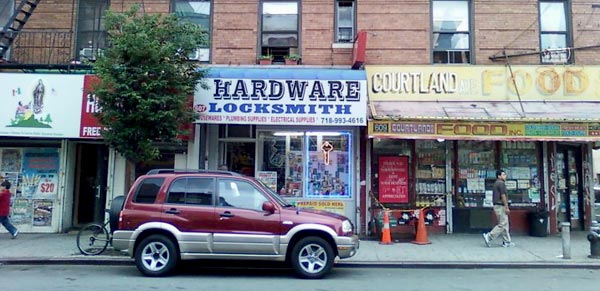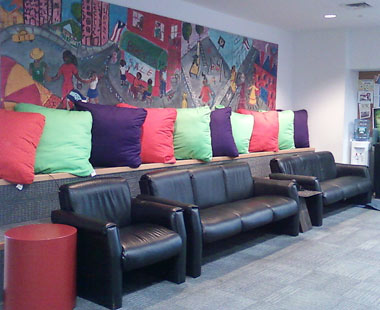 |
A street scene near the Bronx Defenders' office in
the Bronx. (Kony Kim photos) |
Community intake: bite-sized empathy at BxD
Each year the UC Berkeley-based Human Rights Center awards summer fellowships to students from University of California campuses, to enable them to work with human-rights organizations in the U.S. and abroad. Several current Human Rights Fellows, including law student Kony Kim, have agreed to share their experiences this summer, with regular updates from the field to be published on the NewsCenter.
| 12 July 2010
 Kony Kim
Kony Kim
A J.D. and PhD. student at Berkeley Law, Kony Kim aspires to pursue her passions for art and storytelling to become what she calls a "writer-artist-advocate." The daughter of a Presbyterian minister, she received her B.A. in philosophy from Yale (2003) and her M.A. in theological studies at Westminster Seminary (2006). While completing coursework in Berkeley Law's Jurisprudence & Social Policy program, she was inspired by her volunteer work with asylum seekers to focus on refugee rights advocacy, and by her interactions with prison inmates to investigate alternative justice models.
Kim will spend the summer as a legal intern for the Bronx Defenders, which provides legal advocacy and services in one of the country's poorest neighborhoods. Through participant observation, she will research how the organization makes use of "restorative justice," an approach to crime that seeks to involve all affected parties in repairing the harms done.
NEW YORK CITY — The harsh reality of non-profit work is that you can't help everyone. Within the bounds of your mission, you can only strive to help as many people as you can, as much as you can.
At BxD, most services are reserved for those whose criminal cases we're handling. Nevertheless, each day dozens knock on our doors with problems that exceed our geographic boundaries or logistical capacity. Yet no one leaves BxD without first being heard, informed, and, if necessary, re-directed by intake staff.
Every summer intern at BxD signs up for two days of intake duty. Having completed my first shift, I'm freshly impressed by the panoramic range of problems people bring to BxD, by the slightly less panoramic range of services the agency offers, and by BxD's staffers' collective range of expertise.
Doing intake both stirred and broke my heart. The job involved receiving people in the lobby, listening and probing, excavating phone numbers from binders, pinpointing case numbers in databases, chasing down staff attorneys — and (being unable to offer legal counsel) offering and accepting human warmth.
Folks I met on intake duty
I met a Puerto Rican American woman, about my age, who faces the loss of custody over two children. She barely spoke English, and I understand just a smidgen of Spanish. But with the help of inventive gestures and tireless repetition, we managed to communicate — only to find that her case is pending in an upstate court that's beyond BxD's geographical reach. The woman left, shoulders sagging, with a list of legal-aid resources.
I met an African American kid, barely 18, who faces robbery charges because he was walking down the wrong street, at the wrong time, wearing the wrong skin color. (The kid who did it got away.) His trial was in two days — what to do? We logged onto the court database and located the phone number of the court-appointed attorney who should have contacted him. The young man thanked me and walked out on wobbly legs, looking thoroughly scared.
I met a middle-aged Haitian man, a U.S. legal permanent resident, who has been living in New York for years drama-free. This spring he visited his mother in Haiti. On his return, immigration officers ran a background check that revealed an old marijuana offense. He now faces deportation. I paged a BxD immigration attorney, who whisked the man to her cubicle for a full consult. I'm not sure what happened next, but I know I placed that man in good hands.
I met a young Dominican American woman who wants to expunge her criminal record. Five years ago she pled guilty to turnstile-jumping, a misdemeanor conviction that now bars her from the jobs and educational loans she seeks. I paged a BxD criminal defense attorney who imparted bad news: New York State does not expunge misdemeanors. Unfazed, the woman insisted there was no way in hell that such a stupid past incident would ruin her life. We tried reasoning with her, but her bubble just wouldn't be burst. She marched out, misguided optimism intact.
 BxD reception area, where members of the community wait for intake.
BxD reception area, where members of the community wait for intake. I met a young African American man who brought a list of questions: How to file for out-of-state divorce? How to apply for a Certificate of Relief from Disabilities (a document canceling out civil rights deprivations that result from a felony)? How to file a harassment charge against the child-welfare workers who keep banging on his door? I turned to LawHelp.org and printed out relevant links. He apologized for taking up my time with non-emergency questions — though for me it was a treat to send someone home with concrete answers and without a look of despair.
Community-building: BxD within the Bronx
Diversity and mobility — the qualities I wrote about in my first post on the city's subways — these draw me to the city itself, as well. Diversity and mobility make New York a vibrant city, but they also make it an inconsistent community, one whose membership is constantly changing. I enjoy the city's kaleidoscopic culture and I feel dwarfed by the volume and velocity of its activity.
I feel similarly about BxD.
I came to BxD for legal training, but I also sought a community. I expected to find a team of advocates personally embedded in the neighborhood. What I've found is a team of advocates who care for clients and appreciate the neighborhood — but who by and large grew up elsewhere, commute from afar, and spend most of their working hours on courtroom battles and paperwork.
At BxD I've found elements of the sense of community I came looking for — camaraderie among advocates, based on shared passion for the work, and bonding between advocates and clients. Ironically, though, BxD's mission reinforces the physical and social separation between the world of its advocates and that of its clients. Commitment to high-caliber teamwork means hiring the brightest graduates of distant schools. Commitment to winning means waging courtroom battles in which clients can't participate. Commitment to criminal defense means referring out those with non-criminal issues and delegating intake duties to summer interns.
Given all this, I wonder, is there a role here for restorative justice practice, for genuinely open dialogue that creates space for honesty and trust? Is there room to build more of the lasting community ties that RJ values — beyond the office walls and between advocates and the individuals they seek to empower?

 Kony Kim
Kony Kim